How to Draw Vitiligo Boy
At first glance, Martin Senkubuge's drawings look like actual photographs. The artist is the founder of Part of Us, a visual campaign aimed to create awareness about Vitiligo in Uganda, Africa and beyond. His hyper-realistic drawings show the beauty of vitiligo skin and strive to end the stigma surrounding this skin condition.
Born in 1996, Martin Senkubuge has been drawing ever since he was a child. Using charcoal pieces from his mother's fireplace, he would draw stickmen figures on the walls and doors of their house. As he got older, he continued to draw on anything, including book cover pages. While his ability to draw hyper-realistic images was self-taught, the young artist from Uganda has recently graduated with a Bachelor's of Industrial and Fine Arts. During his final year at University, seeking to attach a strong purpose to his drawings, a pioneer work took form – and it all started with Michael Jackson.
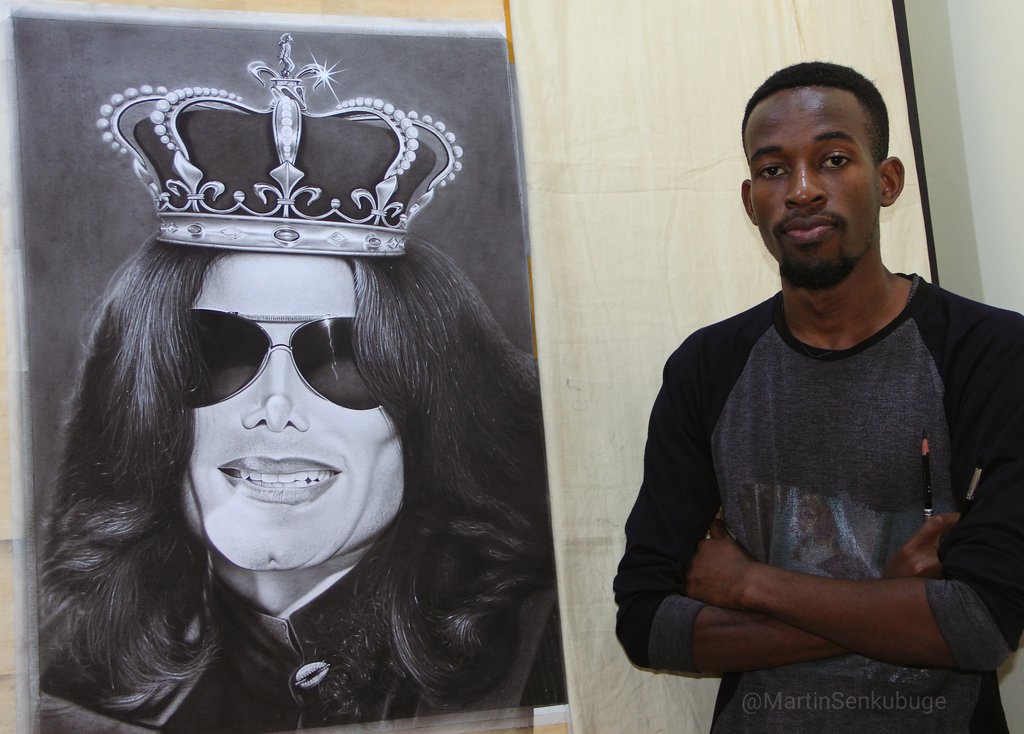
Martin Senkubuge,King of Pop I, 2022. Twitter.
In 2019, Senkubuge was presenting a work titled Melanin Tattoo to a prospective buyer in an exhibition. While talking about how people should not erase their natural skin color (their natural tattoo) through bleaching, the artist mentioned Michael Jackson bleaching his skin to become white. He was promptly corrected by the client. She explained that the singer didn't bleach his skin as a whitening process, but that the depigmentation of his skin was caused by vitiligo, and she criticized Senkubuge's misinformed claim.
After this event, back at his studio, the artist leaned into the information with which he had just been presented. Months of study and research followed this conversation, resulting in the decision to include vitiligo in his art – to be inspired by it. Senkubuge committed himself to portray the beauty and pride of vitiligo skin in his portraits, sharing the untold stories of those living with it.
About Vitiligo
Vitiligo is a long-term skin condition that causes patches of skin to lose their pigment, leading to the affected areas becoming white or white-pink. This condition affects around 1% of the global population. Its cause is unknown and there is no cure, but it is certainly not contagious. Vitiligo can be hereditary, and it is thought that it could be triggered by environmental factors (such as exposure to certain chemicals or an autoimmune disease).
Vitiligo is not a life-threatening condition and it is not physically painful. The biggest challenge ends up being the emotional distress caused by the stigma and the hurtful myths that surround it. In East Africa, the lack of understanding about vitiligo is related to myths and misinformation. People with vitiligo can be seen as cursed or bewitched, and the lack of social support turns a non-painful condition into a source of insecurity and discrimination.
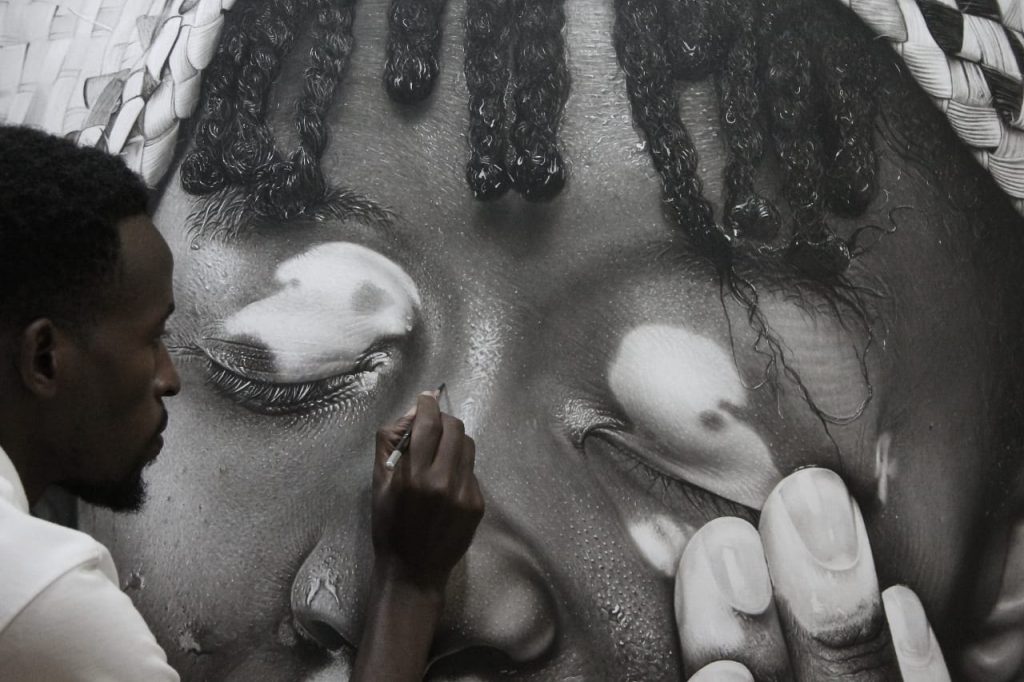
Martin Senkubuge, Shines brightest, 2022. Facebook.
In Uganda, the artist's home country, the most common myth about vitiligo is considering it the wrath of the gods upon an individual: Abalongo b'amwookya, meaning burnt/scorched by twins. After encountering someone who has vitiligo, many are taught to cleanse themselves with herbal medicines in order to wash away bad luck. Those who show patches of discolored skin can be seen as a bad omen and a curse.
Fighting Stigma Through Art
This is precisely what Martin Senkubuge is fighting against. The artist says he "strongly connected and sympathized with a huge stigmatized, traumatized and marginalized group of people", especially considering the silence surrounding scientific facts and the continuance of harmful myths. His drawings have the goal of not only educating people that are not well informed about vitiligo, but also making those who have it feel proud of their skin. His drawings are a form of activism through art, displaying the beauty of vitiligo skin to those who might not know better.
Since art is associated with beauty, I said to myself I would draw pictures and models of persons with vitiligo to break this stigma.
In "Embracing vitiligo: Ugandan artist dispels skin stigma with portraits." The Guardian, Oct 1 2021. Accessed Apr 1 2022.
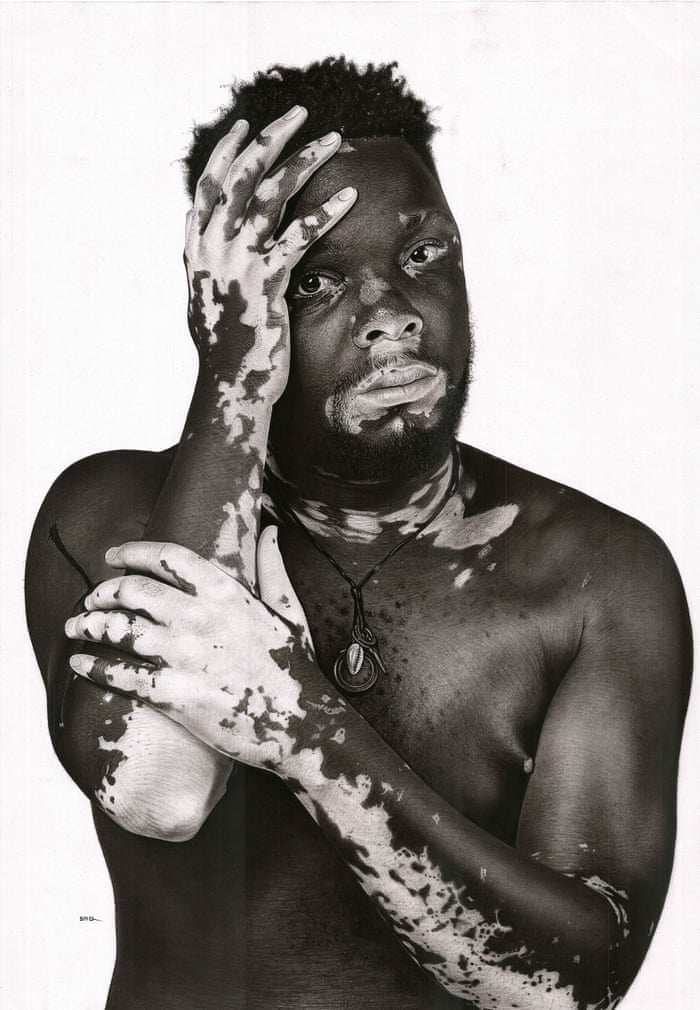
Martin Senkubuge,Vitiligo King, 2020. Photograph by Joshua Ssemaganda and Anthony Patience via The Guardian.
By dedicating part of his career to portraying vitiligo in his drawings, his main purpose is to visually amplify the voices of people who have this skin condition. Serving as a positive influence to dissipate stigma and transform lives, Senkubuge aims to address the challenges that affect minority groups as a result of public ignorance and limited access to knowledge. His ultimate goal is to transform lives in Africa and beyond through his drawings.
Getting to Work
Not only is the concept behind these drawings outstanding, but the degree of hyper-realism that Senkubuge achieves is also astonishing. A lot of time and work is behind such lifelike results, we see that a long process goes behind representing every single detail of a reference photograph on paper. Each drawing requires an average of 280 hours of work until the final product is achieved; that is 8 hours of work per day for over a month. For Vitiligo King (2020), 56 hours were spent only on the lower arm in order to carefully represent the patches and spots.
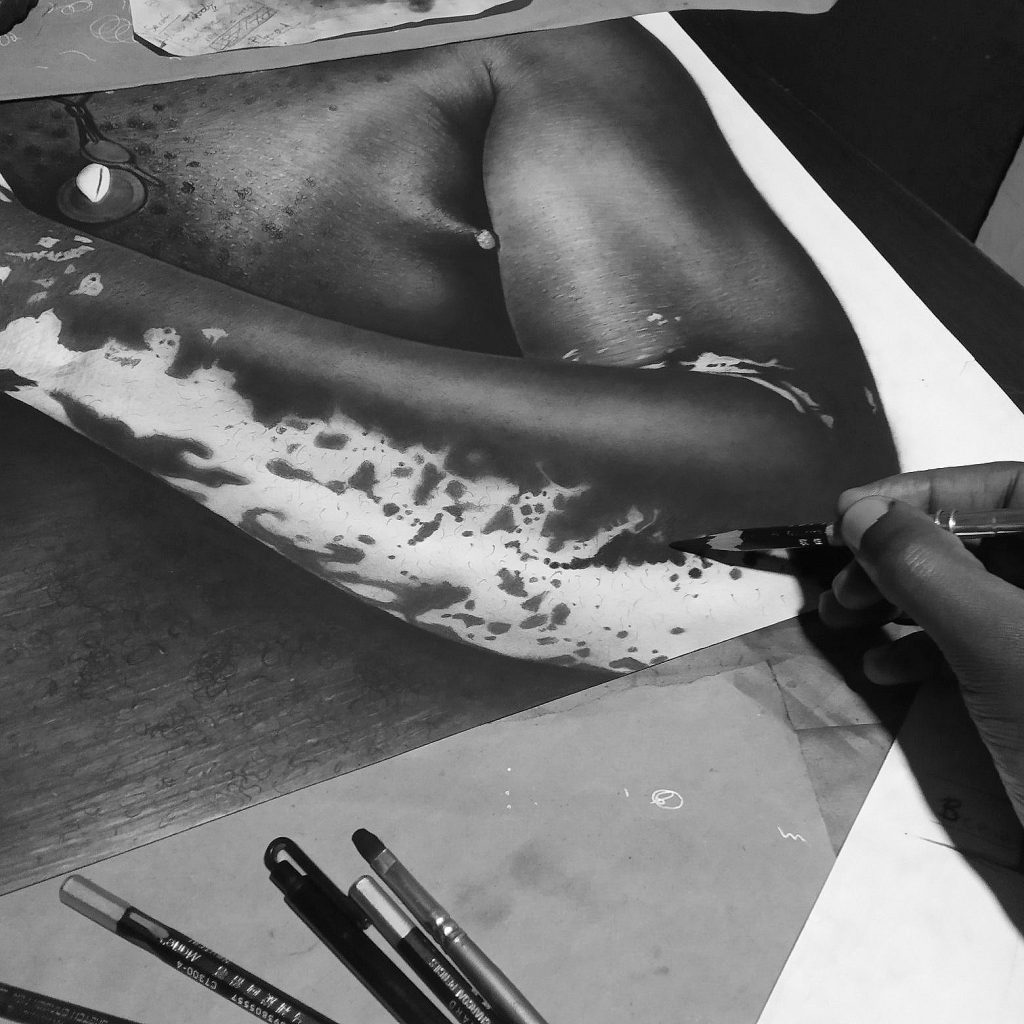
Martin Senkubuge,Vitiligo King, 2020. Image courtesy of the artist. Detail.
Senkubuge's work captures and addresses real-life narratives. It is charged with an emotional depth that comes from understanding his model's experiences and empathizing with the challenges faced by them. The many hours spent over the paper certainly add to the connection of the artist to the artwork. Meditation always precedes the long hours of work – Senkubuge says that it gives him patience throughout the process as he represents every detail of the art piece with charcoal on paper.
I chose to express myself through hyper-realistic drawings because I find peace in paying attention to detail. I love the time that it allows me. This time allows me to experience every detail, to have an experience with my own drawing and enjoy what I make. And it also helps me to meditate all through the process of creation and it gives me peace.
Focus on Africa – Martin Senkubuge talks about his Lifetime Vitiligo Drawing Project/BBC World News. Posted by Martin Senkubuge Art via YouTube, Oct 20, 2021. Accessed Apr 1 2022.

Martin Senkubuge, So Far, 2020. Andariya.
Part of Us
The first phase of Martin Senkubuge's project on vitiligo resulted in an exhibition called Part of Us. The drawings that comprised this exhibit took nearly six months to be completed (from May to September 2020). Due to insufficient resources, it took some time to present these artworks to the public, but a team of 20 volunteers worked for over six months to make it all possible. Finally, in April 2021, the exhibition took place in Kampala, Uganda.
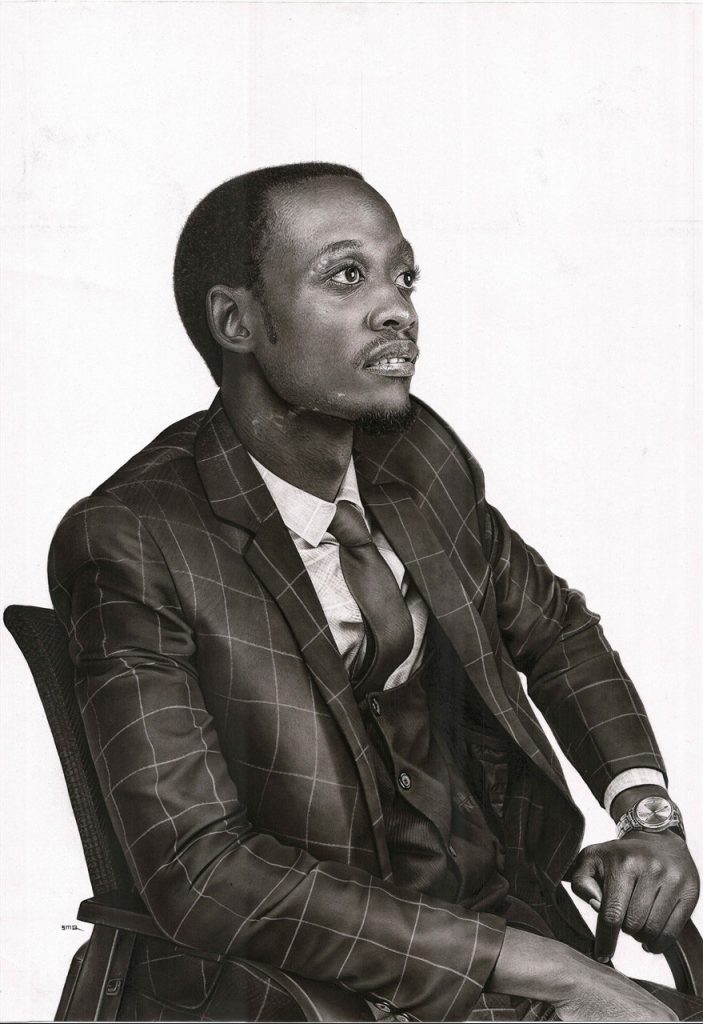
Martin Senkubuge, Reserved Seat, 2020. Vanity Fair.
For this first exhibition, finding models wasn't an easy job – only three people were willing to pose for the drawings. The results of this first step, however, are already thrilling. The reactions to Part of Us have been positive both by the general public and by those who have vitiligo. Now many people from across the globe have reached out to Senkubuge to become available as models for his future series. A second collection is already being created, and a global project is among the artist's plans.
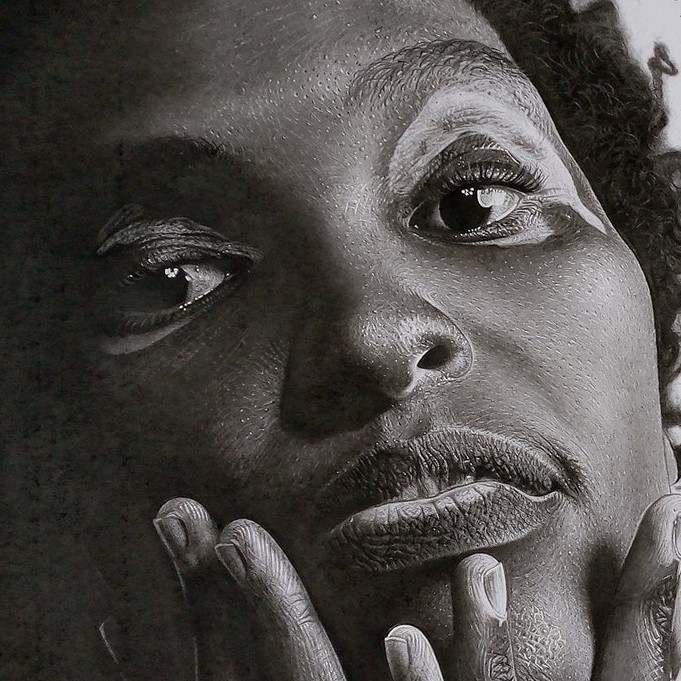
Martin Senkubuge, Costly Smile, 2020. Vanity Fair. Detail.
Eva Atukunda was among the few people that took the risk of being portrayed by Senkubuge. When she first joined the project, Atukunda was still using makeup to cover the discoloration of her skin – even though she always wanted to be herself without it. After the exhibition, seeing her face displayed in so many newspapers, magazines, and websites, she finally took her daughters to school without makeup on. She said that there was no need for it since her face was already healing many souls living with vitiligo all over the world. This is only one example among the so many people who have been touched by Senkubuge's drawings, showing us how powerful and transformative art can be, and how it can truly change lives.
Source: https://www.dailyartmagazine.com/martin-senkubuge/
0 Response to "How to Draw Vitiligo Boy"
Post a Comment